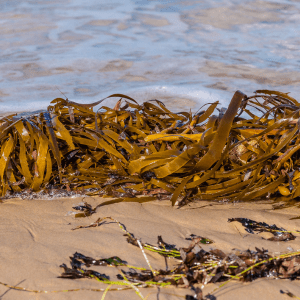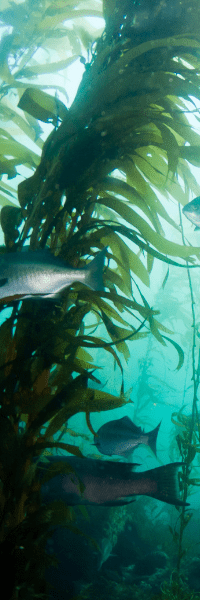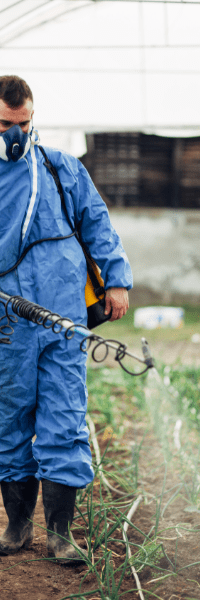The Benefits of
Kelp/Seaweed in Farming

The Nutritional Benefits of Kelp/Seaweed for Crops
While most fertilizers provide only the basic nutrients that plants need to grow, seaweed/kelp provides a host of macro and microelements, vitamins, and trace elements that work together to enhance soil chemistry, improve product quality, and boost crop yields. With so much to offer, it's no wonder that seaweed/kelp is fast becoming the preferred choice among farmers across the globe.
Boost Nutrient Absorption
The high concentrations of potassium, phosphorus, iron, and nitrogen in kelp/seaweed can help your crops absorb more nutrients, leading to faster growth, stronger stems, bigger leaves, and more fruits.

Strengthen Crop Immune System
The bioactive plant hormones in kelp/seaweed can help create stronger and more resilient plants, capable of fighting off disease, pests, and environmental stress.

Improve Taste & Appearance
The beneficial compounds in kelp/seaweed can improve crop flavor, color, and overall quality, making them more marketable and sellable.
The Environmental Benefits of Kelp/Seaweed for Farming Practices
Kelp/seaweed is not only beneficial for crops but also for the environment as a whole. By using seaweed/kelp as a fertilizer, farmers can enjoy a host of environmental benefits, including:
Reduced Soil Erosion
The high levels of organic matter in kelp/seaweed can promote soil stability, enhance soil structure, and prevent soil erosion, leading to improved soil health and crop productivity.
Increased Microbial Activity
The amino acids, enzymes, and natural sugars in kelp/seaweed can provide energy for microorganisms living in the soil, leading to increased microbial activity, better soil fertility, and a healthier ecosystem.
Reduced Need for Synthetic Fertilizers
Kelp/Seaweed is a sustainable, natural alternative to synthetic fertilizers that can help reduce the negative impact of farming practices on the environment by providing a chemical-free and environmentally-friendly solution.
Increased Crop Yields and Disease Resistance
You don't have to sacrifice crop yield for environmental sustainability. In fact, using kelp/seaweed as a fertilizer can lead to improved crop yields, better product quality, and increased disease resistance.
Bigger Yields
The natural growth regulators and micronutrients in kelp/seaweed can help your crops grow faster and stronger, leading to bigger yields and
Less Disease
The antifungal compounds and polysaccharides in kelp/seaweed can help protect your crops from diseases like blight, decay, and wilt, leading to less damage, less
Application Methods for Using Kelp/Seaweed
Foliar Spray
A foliar application means that you are feeding plants by applying liquid fertiliser directly to the leaves as opposed to in the soil. Get in touch with us to find out what application rates you should be using.
Fertigation
Fertigation is an efficient method of nutrient application in which fertilizers are injected through an irrigation system. Get in touch with us to find out what application rates you should be using.
Soil Drench
Apply powdered kelp/seaweed directly to your soil, either by hand or using a fertiliser spreader, and work into the soil to a depth of 15 - 30cm for best results.
Seed Treatment
Soak your seeds in a kelp/seaweed solution for 6-8 hours before planting, to improve germination, root development, and seedling vigor.
Kelp/Seaweed - A Cost-Effective Alternative to Traditional Fertilizers
Wondering if using kelp/seaweed instead of conventional fertilisers will save you money in the long run? The answer is a resounding yes. Not only is it cheaper than synthetic fertilisers, but it also provides an array of other benefits that make it a much better investment for your farm.

Lower Input Costs
Kelp/Seaweed is a low-cost input that is affordable for most farmers, whether you use it in a concentrated form or make it yourself using fresh or dried seaweed.

Better Return on Investment (ROI)
Kelp/Seaweed provides a better ROI than synthetic fertilizers, due to its long-term impact on soil health, environmental sustainability, and crop yields.

Longer Shelf Life
Kelp/Seaweed has a longer shelf life than traditional fertilizers, making it easier to store and transport, without worrying about spoilage, evaporation, or degradation.
Ready to Try Kelp/Seaweed for Your Farming Needs?
Are you feeling inspired to incorporate kelp/seaweed into your farming practices? Let us help you get started today with our comprehensive line of kelp/seaweed fertilisers and application methods. Whether you're a small-scale farmer or a large commercial grower, we have the products and expertise to help you grow healthier, more sustainable crops, and take your farming to the next level.


